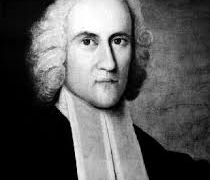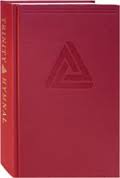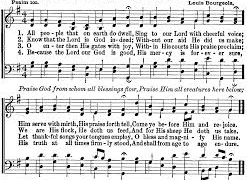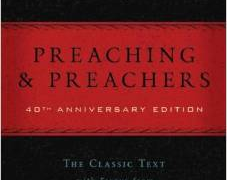 On July 8, 1741, Jonathan Edwards preached what may the most famous sermon ever preached in North America: “Sinners in the Hands of an Angry God.” Follow the links below to find more about the sermon, and Edwards. The conclusion of the sermon is a passionate Gospel call to repentance: “And let every one that is yet out of Christ, and hanging over the pit of hell, whether they be old men and women, or middle aged, or young people, or little children, now harken to the loud calls of God’s word and providence. This…
On July 8, 1741, Jonathan Edwards preached what may the most famous sermon ever preached in North America: “Sinners in the Hands of an Angry God.” Follow the links below to find more about the sermon, and Edwards. The conclusion of the sermon is a passionate Gospel call to repentance: “And let every one that is yet out of Christ, and hanging over the pit of hell, whether they be old men and women, or middle aged, or young people, or little children, now harken to the loud calls of God’s word and providence. This…July 8, 1741 “Sinners in the Hands of an Angry…
 On July 8, 1741, Jonathan Edwards preached what may the most famous sermon ever preached in North America: “Sinners in the Hands of an Angry God.” Follow the links below to find more about the sermon, and Edwards. The conclusion of the sermon is a passionate Gospel call to repentance: “And let every one that is yet out of Christ, and hanging over the pit of hell, whether they be old men and women, or middle aged, or young people, or little children, now harken to the loud calls of God’s word and providence. This…
On July 8, 1741, Jonathan Edwards preached what may the most famous sermon ever preached in North America: “Sinners in the Hands of an Angry God.” Follow the links below to find more about the sermon, and Edwards. The conclusion of the sermon is a passionate Gospel call to repentance: “And let every one that is yet out of Christ, and hanging over the pit of hell, whether they be old men and women, or middle aged, or young people, or little children, now harken to the loud calls of God’s word and providence. This… Many of us are familiar with the inspiring story of the audacious German monk, Martin Luther, nailing his Ninety-Five Theses to the church door in Wittenberg on October 31, 1517. Lots of us know that one of his great concerns was the doctrine of justification by faith alone. And some of us know that this doctrine has been a hallmark of faithful evangelical preaching ever since. But we may not have ever appreciated just exactly how radical this truth is. Getting Ready to Hear a Radical Truth Justification by faith is one of the most stunning…
Many of us are familiar with the inspiring story of the audacious German monk, Martin Luther, nailing his Ninety-Five Theses to the church door in Wittenberg on October 31, 1517. Lots of us know that one of his great concerns was the doctrine of justification by faith alone. And some of us know that this doctrine has been a hallmark of faithful evangelical preaching ever since. But we may not have ever appreciated just exactly how radical this truth is. Getting Ready to Hear a Radical Truth Justification by faith is one of the most stunning… Praise to the Lord, the Almighty (based Psalm 103/150), 1680 Praise to the Lord, the Almighty is one of the very best hymns (thinking of the combination of text and tune) written in the last three hundred fifty years, and it is no surprise that it is a favorite of our congregation. The text of the song is based on Psalms 103 and 150. In the Scottish Psalter and Church Hymnary of 1929, it finds itself aptly located in the section delineated “God: His Being, Works, Word.” The song’s author was Joachim Neander, the grandson of a…
Praise to the Lord, the Almighty (based Psalm 103/150), 1680 Praise to the Lord, the Almighty is one of the very best hymns (thinking of the combination of text and tune) written in the last three hundred fifty years, and it is no surprise that it is a favorite of our congregation. The text of the song is based on Psalms 103 and 150. In the Scottish Psalter and Church Hymnary of 1929, it finds itself aptly located in the section delineated “God: His Being, Works, Word.” The song’s author was Joachim Neander, the grandson of a… One of the best-known and loved metrical psalms still in wide use today is this setting of Psalm 100. Metrical psalms used to be the core of what was sung in Protestant worship services (by Presbyterians, Anglicans, congregationalists and others).…
One of the best-known and loved metrical psalms still in wide use today is this setting of Psalm 100. Metrical psalms used to be the core of what was sung in Protestant worship services (by Presbyterians, Anglicans, congregationalists and others).… I received my first copy of D. Martyn Lloyd-Jones “Preaching and Preachers as a gift from a family in my home church as I was just beginning my studies in seminary. My copy was from the 14th printing of the first edition. I had been introduced…
I received my first copy of D. Martyn Lloyd-Jones “Preaching and Preachers as a gift from a family in my home church as I was just beginning my studies in seminary. My copy was from the 14th printing of the first edition. I had been introduced…